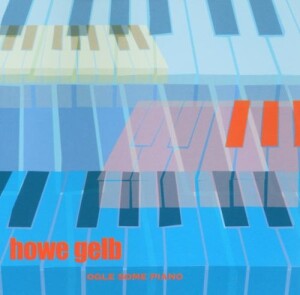 Tucson’s musical savant Howe Gelb has released an album of mostly instrumental keyboard music, Ogle Some Piano.
Tucson’s musical savant Howe Gelb has released an album of mostly instrumental keyboard music, Ogle Some Piano.
It’s a curious disc, even by Gelb’s eccentric standards — 19 tracks of piano meanderings in a variety of styles: jazz, rock, pop, tin pan alley and experimental avant-garde weirdness. And the titles seem a parody of art-rock pretentiousness: “Spangle Bib of Radiant Value,” “Hammered and Hampered, We Then Took The Deeds Down By The Dozen,” and “Someday They Will Have A Name For What Ails You As Opposed To Being Saddled With Speck Elation” are representative.
The best tracks include Joey Burns on double bass and John Convertino on drums, making these tracks more or less Giant Sand pieces from before 2003 when that band’s personnel changed. There are also contributions from the usual suspects, including Nick Luca and Craig Schumacher of Wave Lab studios in Tucson, and the late great Rainer Ptacek as well.
But mostly, it’s Gelb with his piano and his musical wit, off-the-wall improvisation and studio wankery. Which, depending on your outlook, can be totally mystifying or lots of fun.
The opening track, “Spangle Bib…” is a long exploration in several “movements,” almost serving as an overture to the rest of the disc. It features the basic trio playing snippets of variations on pop tunes and themes, whose names and provenance seem always to lurk just beyond the grasp of the conscious mind. One section is a fairly conventional blues (in the jazz sense) with a majestic or patriotic air about it, but which is continually subverted by slippage into silliness and deceptively simple-sounding improvisations. It then fades away into a section with Gelb’s highly-processed vocals and post-psychedelic poetic lyrics: “Reinvention is a mother/takes you by the collar/out of the urgency, emergency/delivering you to another…” Behind this is a doubled piano line, one normal, the other one processed to resemble the tinkling of a keyboard in a western-movie honky-tonk. And always, keeping right up with the inspired lunacy are the bass and drums of Joe and John, until the piece slows and fades like a Victrola winding down.
And that’s just the opener. On and on it goes, like a demented carnival calliope-player’s lonely dreams. The left-hand piano exercise of “Reinvision Stream Block and Then Fumble” calls to mind Dumbo’s fevered “Pink Elephants on Parade.” “Hammered and Hampered” has a loping melody played on melodica backed by thundering drums, like some French surrealist film score. “A Memento Was Slid in Between the Actual House of Cards So As To Maybe Remain” has Ennio Morricone overtones, opening with a dissonant and jazzy trumpet-drum duet, on an incredibly catchy melodic snippet. “Espresso Spills…” is a jumpy bossa nova improv. “Essential Tinge” features echo-laden spacey synth burblings. “Especially After Having Leaned on the Crutch…” is impressionistic, Satie-like noirish meandering, with a lovely but dark bowed bass line. “Hokum Bigboy” is a blues in 6/8 by the jazz trio plus trumpet, exploring far afield within a limited chordal structure.
My favorite title is track 7, “Notification Was Lost in the Mail and That Turned Out to be a Good Thing.” It’s a shimmery slow improv featuring piano and trumpet.
Some of these tracks, particularly “Splendid in a Way…,” sound like they’re probably out-takes from recording sessions from one of Gelb’s 2003 releases, The Listener. “Splendid” is obviously a jam on a tune called “Piango,” played on what sounds like a “prepared” piano, John Cage-style. Others play with melodies from old singles like “Love Is Blue” and “Take Five.”
Howe Gelb is a sonic sponge, absorbing everything around him with all his senses and processing it into music that reflects his unique, idiosyncratic vision. So it’s only an illusion if this recording sometimes sounds like someone turned a drunken ferret loose on a piano keyboard. Gelb, Burns and Convertino make this kind of offbeat improvisation sound easy, but it’s not. “Ogle Some Piano” is at times playful, other times enigmatic, and sometimes merely puzzling. But give it a few listens, even in the background, and you’ll soon find yourself humming along with its bizarrely catchy tunes.
(Ow Om, 2004)
